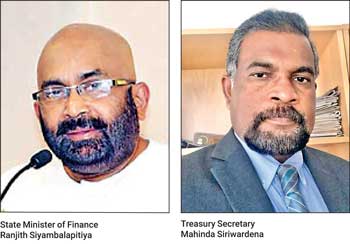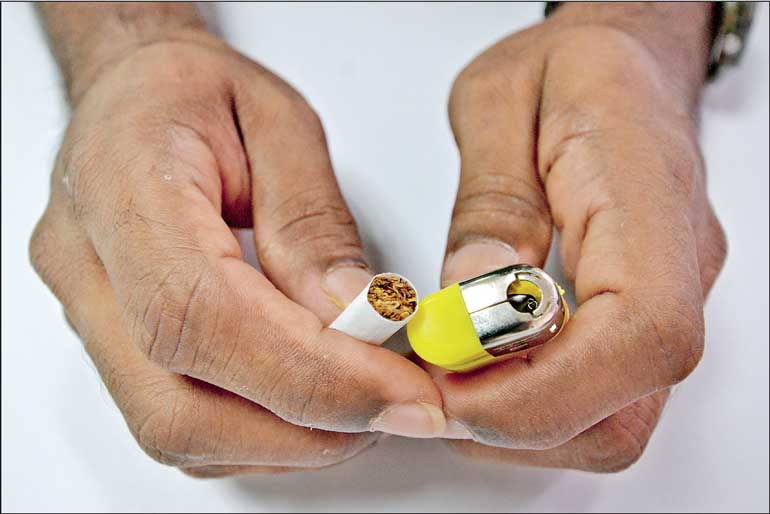Thursday Feb 19, 2026
Thursday Feb 19, 2026
Tuesday, 25 July 2023 00:10 - - {{hitsCtrl.values.hits}}
In 2022, cigarettes in Sri Lanka were already the most expensive in the world in terms of purchasing power parity. With recent product price hikes, inflation skyrocketing to over 90% at a point, job losses and an excessive tax regime – consumers can no longer afford to purchase cigarettes as they did, and this will result in further erosion of volumes and Government revenue
 By Kumar Ranaweera
By Kumar Ranaweera
With the advent of COVID and the fallout of the economic crisis, the Government was on a mission to boost earnings to navigate a quick course out of its self-made calamity. The unwarranted abolition of PAYE tax in 2019 exacerbated the earnings crisis, and with no time to grow the tax net, the Government resorted to slap excessive levies on earnings heaping immeasurable burdens on an already bludgeoned middle class.
This left the Government with no choice but to consider workable alternatives for the up to 36% tax on earnings, and levies imposed on any person earning just Rs. 100,000 a month. Some countered that with a cap at 26% and the salary slab to Rs. 200,000, the Treasury would only lose Rs. 7 billion against current projections. It was evident that 2023 was to become a year of taxation.
The point of general contention is whether measures adopted by the Government are adequately considered, and through implementation if they could deliver the revenue objectives envisaged. Is the Government and its officials giving adequate ear to industries on the fallout of draconian measures? Practical considerations are still being cast aside over desperate measures despite the ramifications.
For instance, following the excise tax revision at the outset of this year, the Government witnessed a significant decline in tax incomes from alcohol and tobacco products, as affordability took a serious turn. The drop was so significant that some members in Government questioned if authorities must break the pattern and entrenched romanticised cultural conceptions and reduce prices of alcohol and tobacco products. However, come the end of the second quarter, it went ahead with a second excise increase which resulted in the price of legal cigarettes and alcohol increasing by over 40%, that left consumers and analysts shaking their heads.
In 2022, cigarettes in Sri Lanka were already the most expensive in the world in terms of purchasing power parity.
The price of a John Player Gold Leaf, the most purchased cigarette, reached Rs. 100 a stick at the beginning of this year, as cigarette prices in Sri Lanka crossed into a hitherto unknown realm. Sitting at Rs. 125 now following the second excise increase, the Government’s revenue expectations and grip on law and order are set to go up in smoke.
Releasing its quarterly financials for the 1st quarter, Ceylon Tobacco Company notes a drop in volumes whilst revenues remained flat in what is usually a busy quarter. Net incomes were significantly lower with higher operating costs, which impacted Government earnings.
In 2019, the price of a legal cigarette went beyond what was affordable to consumers and resulted in a revenue drop to the Government for the first time in recent history. It is noteworthy that consumers had merely switched to cheaper alternatives such as beedi and smuggled cigarettes as opposed to ceasing to smoke. This trend will worsen now but with little reduction in real smoking incidence
With recent product price hikes, inflation skyrocketing to over 90% at a point, job losses and an excessive tax regime – consumers can no longer afford to purchase cigarettes as they did, and this will result in further erosion of volumes and Government revenue. In 2019, the price of a legal cigarette went beyond what was affordable to consumers and resulted in a revenue drop to the Government for the first time in recent history. It is noteworthy that consumers had merely switched to cheaper alternatives such as beedi and smuggled cigarettes as opposed to ceasing to smoke. This trend will worsen now but with little reduction in real smoking incidence.
The 20% tax hike on alcohol products results in over 12% decline in earnings, despite a highest-ever revenue target. Excise officials estimate the department will likely miss this target by over 30%.
The Excise Department itself notes there has been a marked increase in the consumption of illicit liquor during this year, whilst production of legal products had dipped as much as 40% in some months.
It is safe to say excise taxes in Sri Lanka have reached the tip of the Laffer Curve.
The Laffer Curve is a relationship that suggests there is an optimum tax rate that maximises revenue. When rates go beyond that optimum point, it becomes counterproductive where industry and Government both tend to lose.
This is where Sri Lanka is today with its excise taxes. It achieves no productive end. There is less revenue, people are switching to cheaper illegal alternatives spawning a thriving black market as the health of Sri Lankans continues to deteriorate faster.

The anti-tobacco and alcohol lobby will drum up their usual counter that lesser volumes in sales recorded by companies translate to a healthier society, and less state expenditure on treating victims of non-communicable disease. They often make it out that the Government’s entire annual health spend is channelled towards treating victims of cigarette smoking and alcohol. But there is no official record or breakdown of the real cost of these popular vices, in a country where over 60% of the population is prone to diabetes. How could such a determination be clinically made in the first place?
What about the growth of illicit products? A recent report published by the Research Intelligence Unit estimates that in 2023, over 700 million illegal cigarettes will make their way into the country. Beedis in Sri Lanka is a mammoth industry that will serve over 6.5 billion sticks in 2023 alone, with minimal regulation or taxes. Many smokers have already traded down towards beedi, which costs just between Rs. 8 to 12 a stick. Lobby groups have been drumming for excise price hikes to be above inflation, and the outcome of such moves are now crystal clear.
As alluded to before, excise rates on alcohol and tobacco products in Sri Lanka have gone over the edge. They are now counter-productive, eroding the good intentions of Government and society.
They do not bring in adequate Government tax revenue, fuel a massive uncontrolled illicit market that is spawning a law-and-order crisis.
The Government is unlikely to take the bold and decisive step of revising prices downwards. But it would be prudent to maintain prices to stabilise revenue, and perhaps more importantly to control the growth of an illicit market that could see crime spiral out of control. The president notes that this is a time for bold decisions for the future of this country and its people, and remarkably tobacco and alcohol prices also form part of that picture.
(The writer is a Research Associate attached to a leading international Auditor in Colombo, with a special interest in agriculture and FMCG products.)